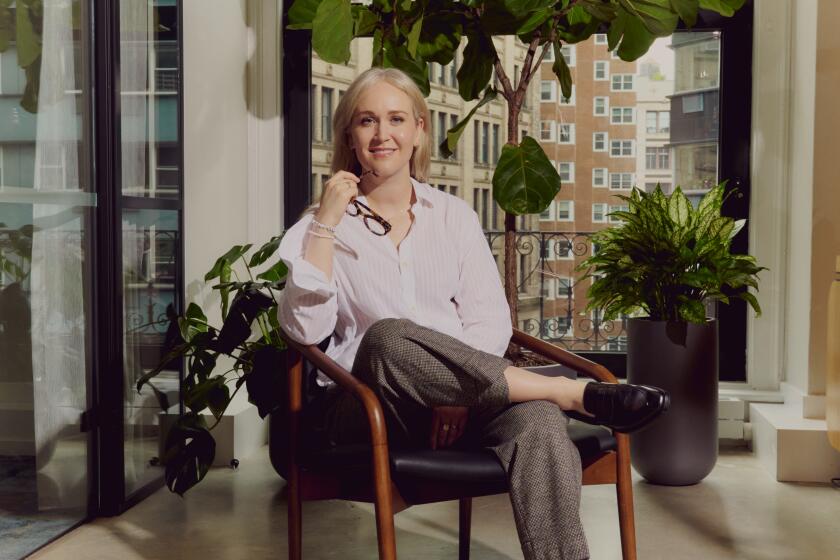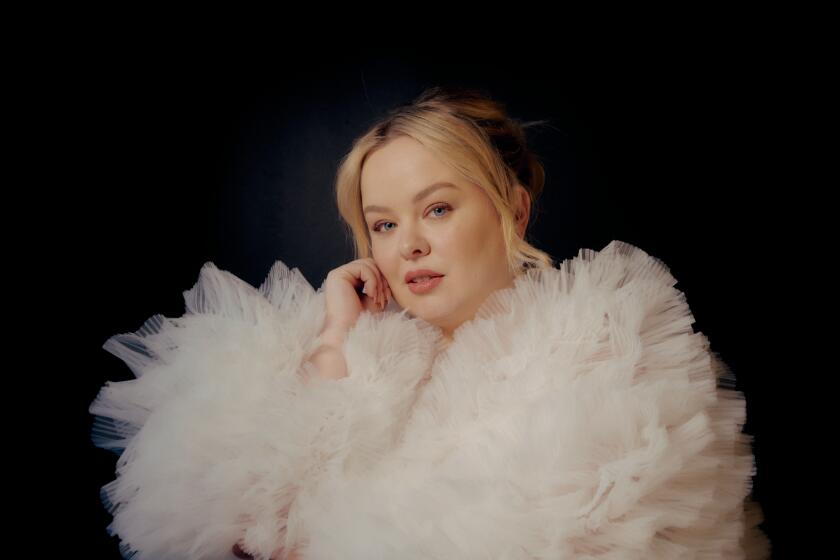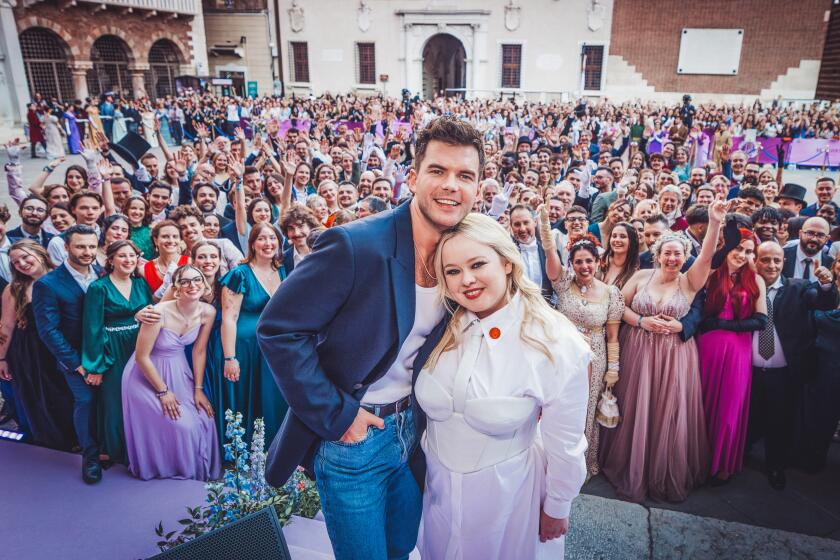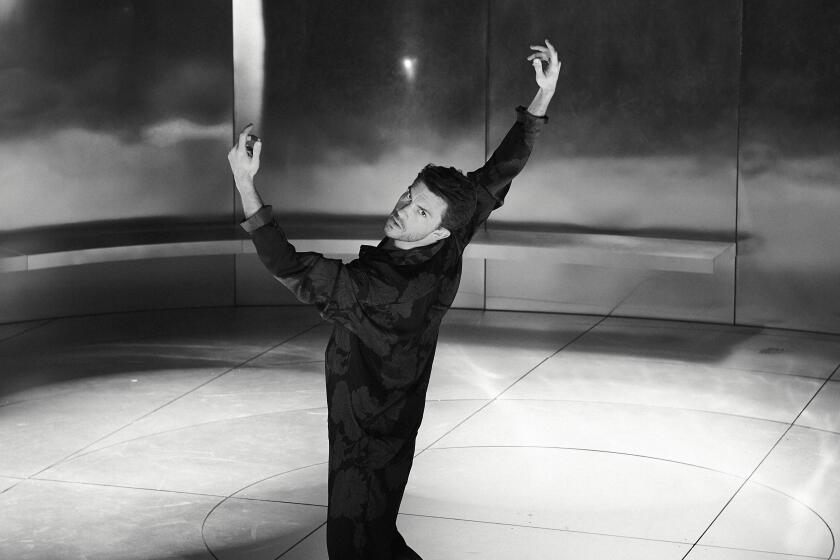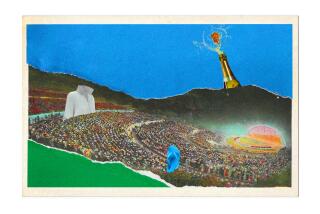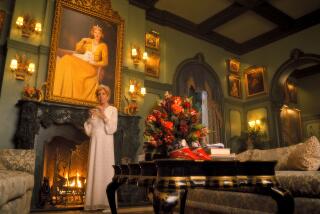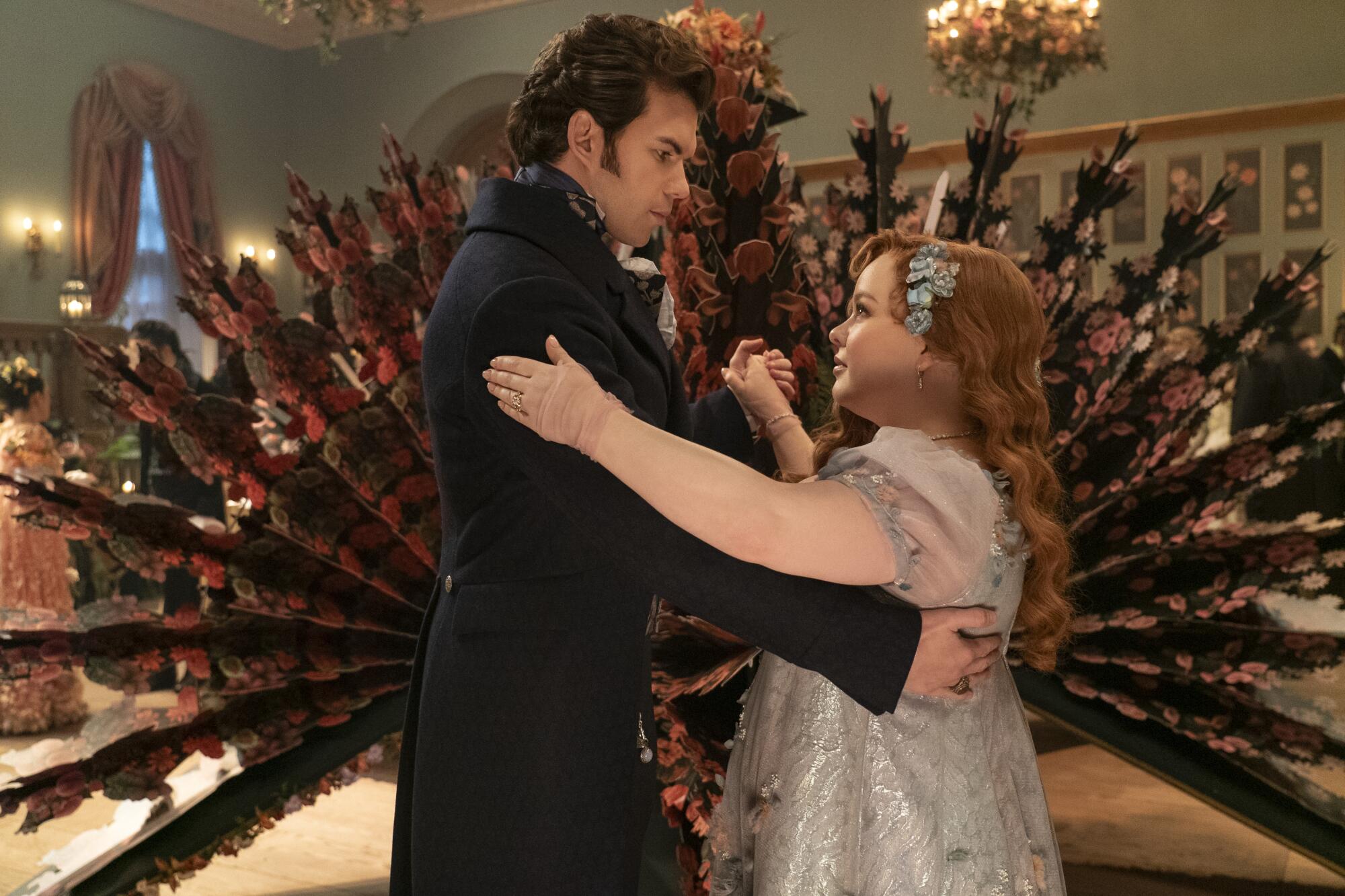
LONDON — The members of the ton, dressed to the nines, are standing around an ornately styled ballroom when a flurry of footmen arrive bearing the latest edition of “Lady Whistledown.”
The ballroom is ostensibly part of a stately house now owned by the Mondrich family, but in reality it’s inside a nondescript film studio on the outskirts of London. It’s been designed, built and decorated for today’s Botanical Ball, the setting for a series of dramatic revelations in the “Bridgerton” episode titled “Romancing Mr. Bridgerton.”
As the footmen file in, “Bridgerton” choreographer Jack Murphy instructs cast members to move “frenetically.” “It’s gluttony for information,” he says of the latest “Whistledown” issue. “You’ve been starved.” The actors react accordingly, frantically grabbing for the envelopes, much to the shock of Penelope Featherington (Nicola Coughlan), who, for once, did not write it.
Like any good “Bridgerton” scene, it’s fitting that this moment should take place in a ballroom. Since the first season, the series has established itself as the gold standard of lavish onscreen parties, all of which have been built from scratch. For Season 3, which is split into two parts, with the latest arriving Thursday, showrunner Jess Brownell and production designer Alison Gartshore wanted to go even bigger and more ornate with the show’s iconic balls.
“We landed on the fact that it would really help to have specific themes for the balls,” Brownell says. “We wrote the theme of the balls into every script, which we had never done before. Every episode has its own theme that is reflected in ‘Lady Whistledown,’ reflected in the stories and reflected in the balls, which also informed the decor and the gowns.”
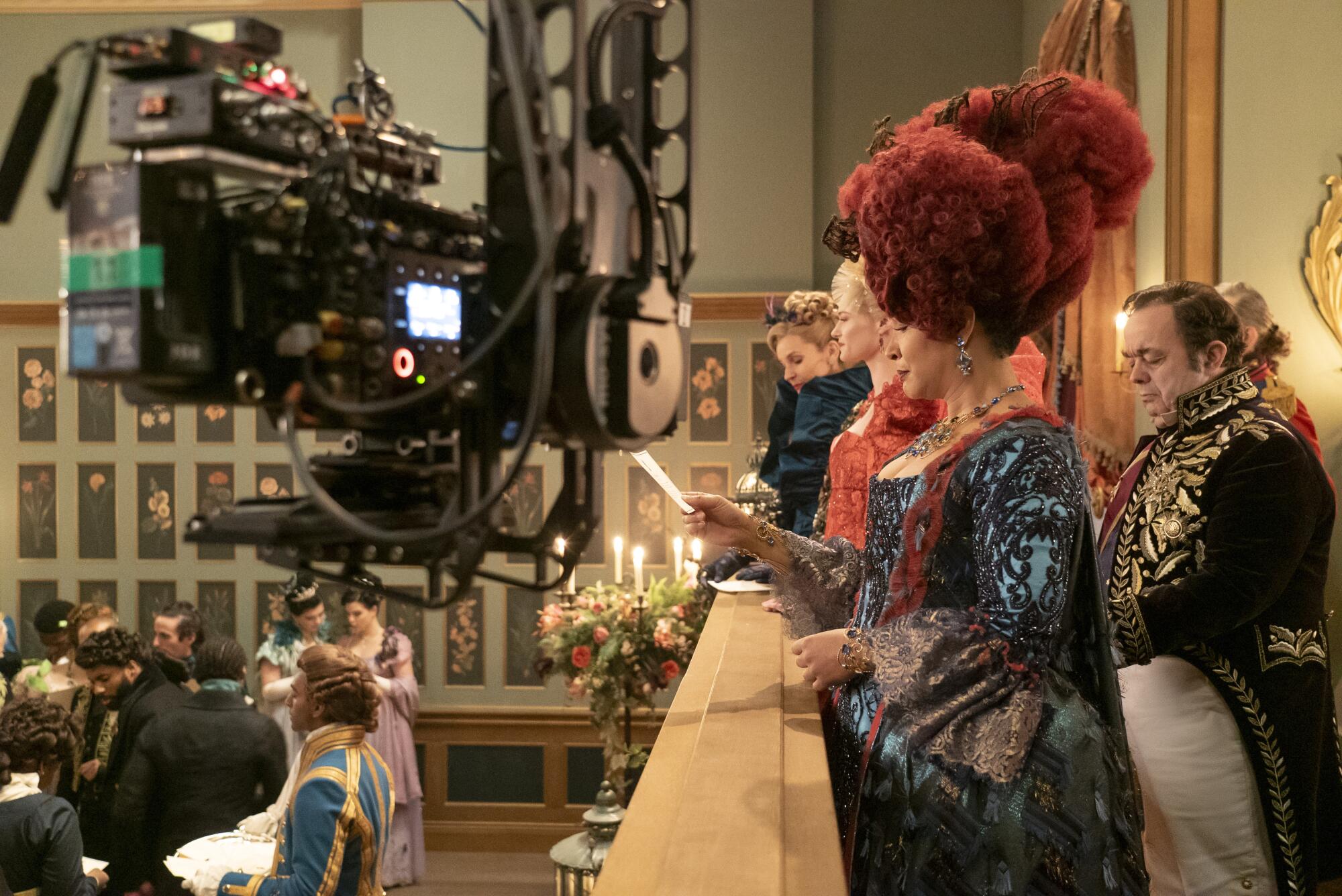
She adds that the social events are “the set pieces of the series in the same way that in ‘Grey’s Anatomy’ the major set piece is the hospital,” referencing executive producer Shonda Rhimes’ long-running ABC series. “Our workplace is a ball.”
During the first week of writing for Season 3, Brownell asked for pitches for various themes. Initially, there were dozens of ideas, some “easier to pull off than others.” It was narrowed down to eight, one for each episode, although not every party scene is technically a ball (and one is, of course, a wedding).
“Bridgerton” showrunner Jess Brownell discusses Season 3, the debate with Shonda Rhimes over Colin’s virginity, Julie Andrews’ fate as narrator and the visual changes coming to Season 4.
The season opened with the Four Seasons Ball, to emphasize transformation and change, and it has also included the Innovations Ball, the Full Moon Ball and the Botanical Ball, which was filmed in August 2022.
“It’s really useful for us as the art department design team because it gives you something to hang the design on,” Gartshore says. “A ball is an easier problem to solve if you’ve got a theme to work toward.”
Each ball takes about a week to film and can include choreographed dances, real food and endless attention to detail. The balls are, as Coughlan puts it, a “real labor of love.”
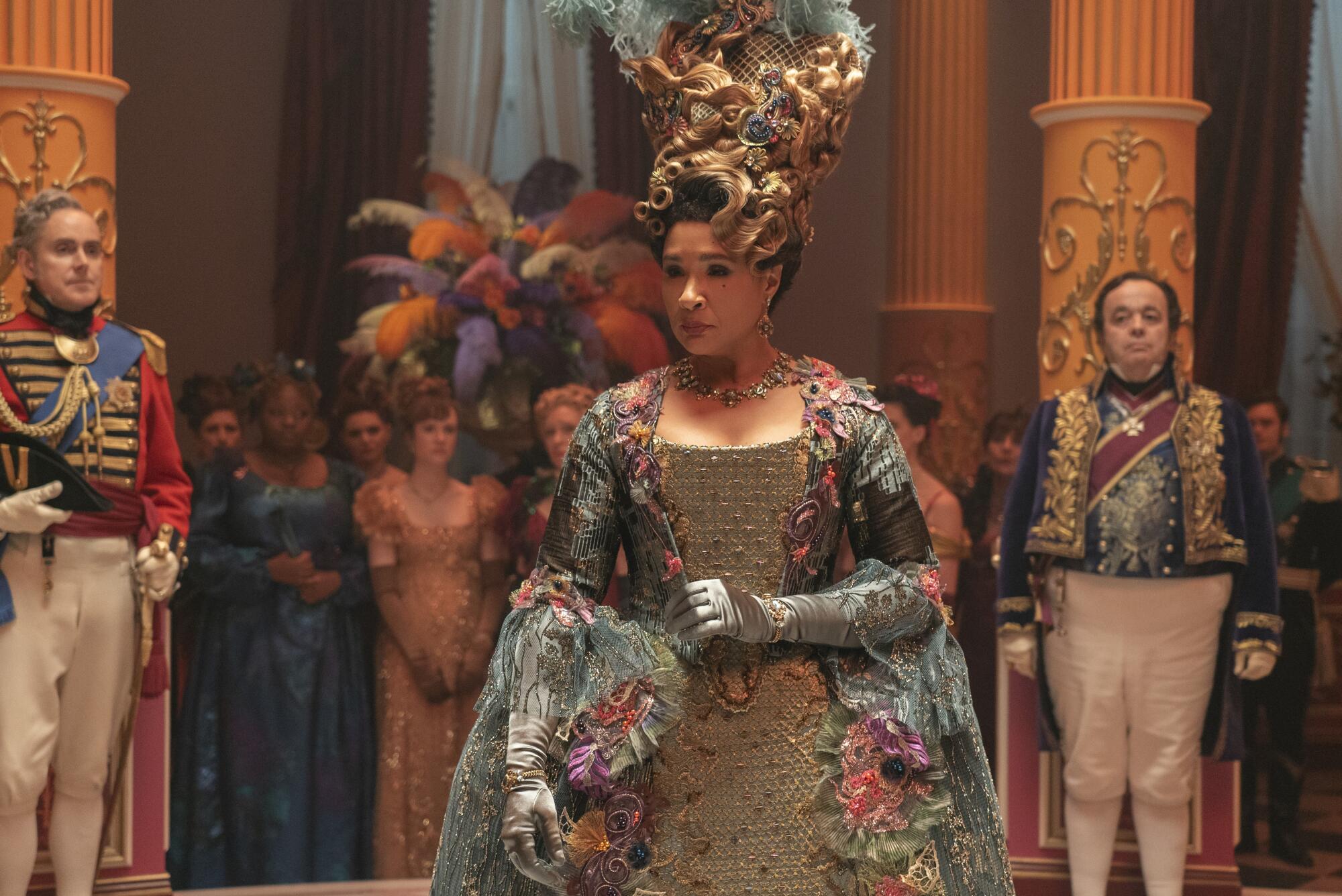
“Even now, having shot so many over the three seasons, every time it does get you,” Coughlan says, standing on the set between takes. “It’s really astounding. [As] an actor, you are privileged if you [can] have the suspension of disbelief yourself. The most I feel that is walking into the ballrooms.”
Luke Newton, who plays Colin Bridgerton, adds: “There’s an amazing moment when we will walk in the room together for the first time and we see what they’ve done and what it looks like, which is mind-blowing every time.”
Here is how the “Bridgerton” team pulls together the over-the-top ball scenes.
Building the balls
Each ball requires its own set, whether it’s on the “Bridgerton” soundstage or on location. Gartshore prefers using the soundstage because it allows for more control, but it also requires being creative since the team often builds and rebuilds the ball sets on the same stage. She compares it to doing a “huge jigsaw puzzle.”
“For me, the design process is all in the research,” she says. “For the Botanical Ball, there were two key images for the color palette and the explosion of floral. We had to reinvent it into a slightly smaller space that matched the size of the Mondrich house, which is [filmed at] a location.”
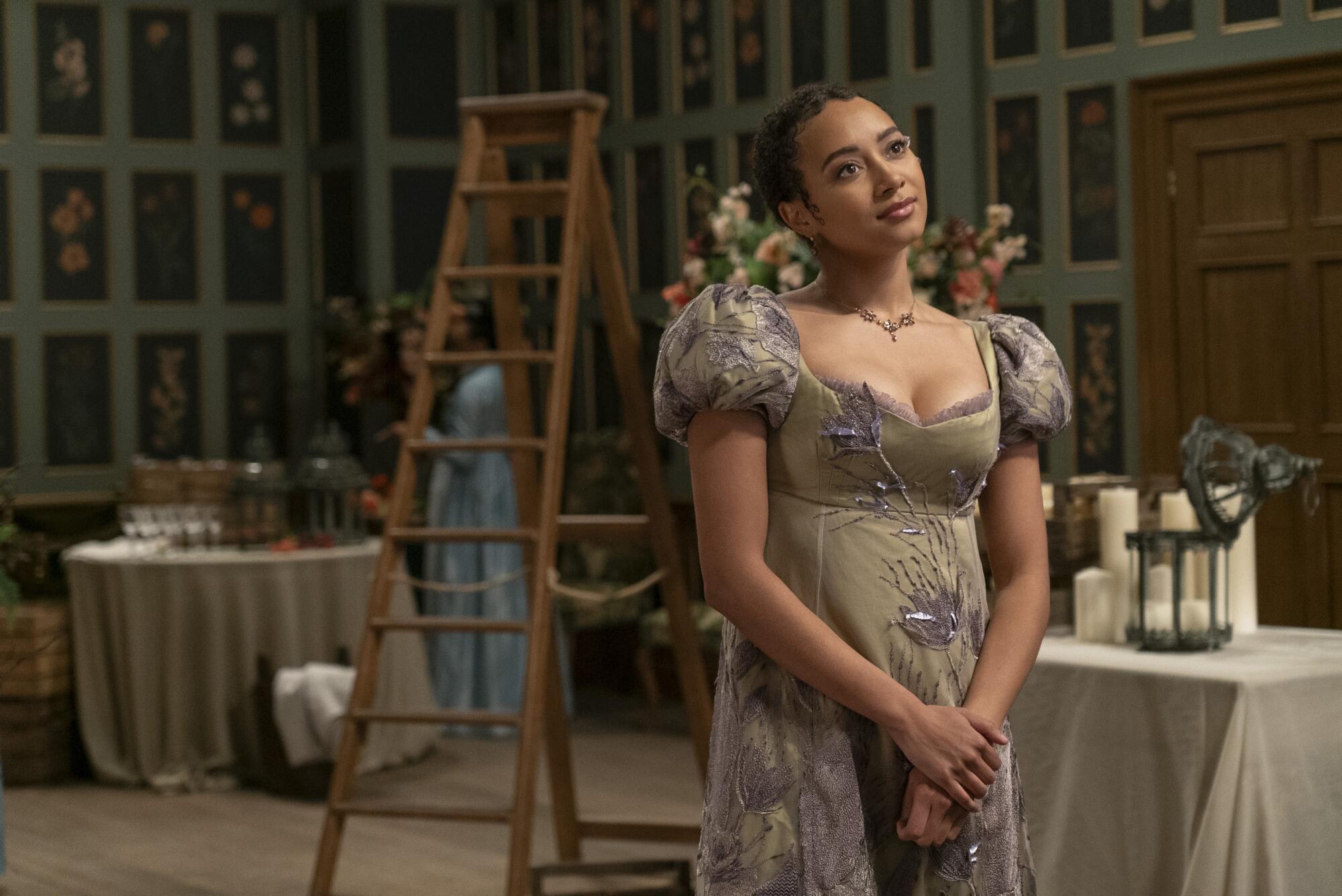
This season, three real-world locations in England were used: Osterley Park and House in Isleworth for the Full Moon Ball, Grimsthorpe Castle in Lincolnshire for the Innovations Ball and Hampton Court Palace in Richmond for the Queen’s Ball.
“We had to go farther and farther afield this season to find locations because in Seasons 1 and 2, we shot at so many of England’s great houses, and they all have very recognizable architecture,” Brownell says. “We were having to travel hours and hours for some of our locations this year. The Innovation Ball is hosted by a character we called Regency Jeff Bezos, so we needed a location that looked sleek, which is a unique architectural idea for Regency time.”
This season of ‘Bridgerton’ sees Nicola Coughlan’s Penelope Featherington move to the center of the story, which the actor says is reflective of her own life and career.
On the walls of today’s ballroom, Gartshore created floral panels to emphasize the theme. “The flowers represent different things [about] the characters in their relationships,” she says. “Passion flower for faith, rose tulip for love and calla lily for beauty.”
In total, designing and constructing a ball set takes up to 12 weeks. Gartshore starts with the research and the initial design and then hands it off to the art directors, who create technical drawings and three-dimensional models. While the actual set is being built, Gartshore and set decorator Natalie Papageorgiadis worked on the fine detail, from chandeliers to wall paneling to the food. The Botanical Ball required thousands of fake flowers, acquired by the show’s florists.
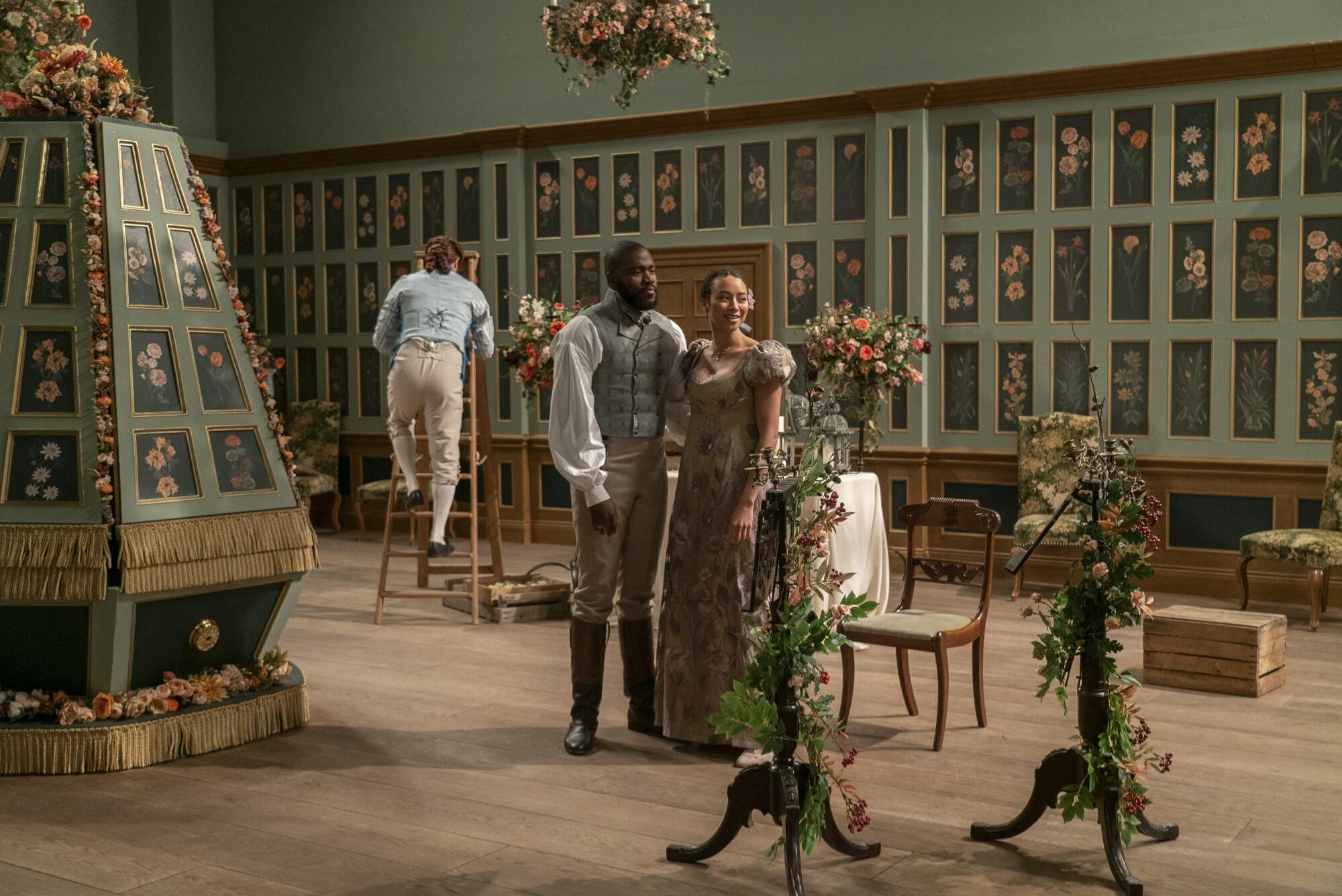
“What sets ‘Bridgerton’ apart from a lot of other studio period dramas is [that] the level of detail is phenomenal,” Gartshore says. “People really go the extra mile. And we’re not doing a dark 18th century drama — it’s much more lighthearted, colorful and visual.”
The Botanical Ball also required an extra wow factor. Gartshore enlisted paper artist Annemarieke Kloosterhof to craft an impressive origami flower box, which convinces Queen Charlotte that the Mondrich household is worthy of high society.
“We needed a moment of spectacle to impress the queen, so I thought perhaps we could have something in the center of the room that’s quite a mysterious object on first sight and looks like part of the room but reveals itself later,” Gartshore says. “It was quite tricky, and it had to actually be mechanical. It took a good couple of weeks of real brain power and looking at different pop-up books to figure it out.”
Creating the looks
The costumes are essential to the immersive feeling of each ball. Costume designer John Glaser, associate costume designer Dougie Hawkes and assistant costume designer George Sayer focus on two levels, starting with the background cast, which can range in size depending on the scope of a scene. It takes about six weeks to create and prepare all the costumes for one ball.
“We want to infuse the supporting artists into the look of the ball,” Glaser says. “For the Botanical Ball, there’s lots of leaves and plants on the dresses and on the sleeves — each costume goes through embellishment. This ball is about 50 men and 50 women, plus an orchestra.”
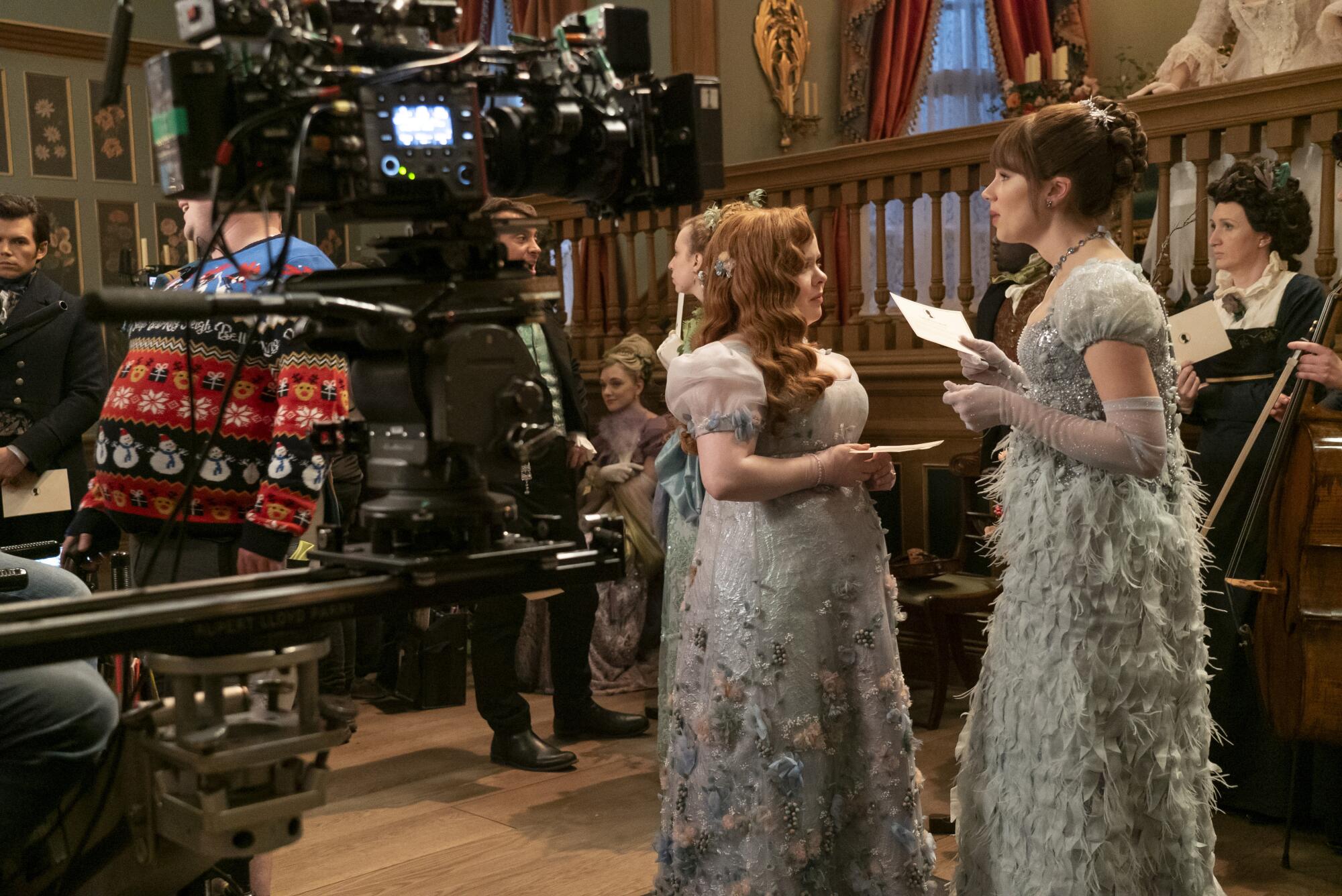
For lead cast members, Glaser and his team design and build the costumes from scratch using a “library” of fabrics they are continually expanding. The details are essential, often nodding to the theme. “If you look at Prudence [Featherington] today, the inside of her sleeve is like a little terrarium with flowers,” Glaser says. “You have to look at the clothes closely, because there are lots of little hints.”
For the women, a look involves the costume itself, designer shoes, custom-made jewelry and hair ornaments. For the men, Glaser also designs the suits from scratch but ensures that they reflect “Bridgerton” style rather than just period accuracy by incorporating color or unusual cuts. For the Botanical Ball, he embraced a specific color palette to complement the set design.
Even in an era of constriction, Netflix’s promotional campaign for ‘Bridgerton’ proves that Hollywood still has the resources to make magic when it chooses to.
“If you look at the walls, it’s a lot of green, yellows and pinks,” he says. “We like to layer different colored fabrics to make one color. We use modern fashion references, which is where our layering comes from. The Full Moon Ball was lots of silver and sparkle. The Four Seasons Ball was lots of color. This ball has less color, but more texture with leaves and plants applied to the costumes.”
For hair and makeup designer Erika Ökvist, the key is not to repeat anything, although some of the wigs are reused and re-purposed. Each ball needs to showcase a unique aspect of a character’s personality.
“No matter what we do, we still recognize them, but it is always still a totally new look,” Ökvist says. “You also have to look at all the hairstyles and makeup to see how they all work together. You want it all to come together like a visual symphony that feels harmonious and moves smoothly.”
Dancing to the right tune
What’s a ball without a little song and dance? Since Season 1, Jack Murphy has been the show’s choreographer, helping the actors to find their feet in the ball scenes. Like the rest of the crew, Murphy is inspired by the visual aesthetic.
“The design informs me of the tempo and the rhythm,” he says. “And it also informs me of the configuration of the dances.”
Over the seasons, Murphy has created a fusion of Regency and modern dance. The choreography maintains the “style and etiquette” of Regency dance, but, like with the music, Murphy wants to bring a sense of contemporary energy to the pieces. Typically, Murphy enlists background dancers to accompany the actors. For the Botanical Ball, 16 dancers performed alongside Coughlan and Newton, but during the larger balls, his core group is 24. They have only a few days to rehearse, while the lead actors actually get less.
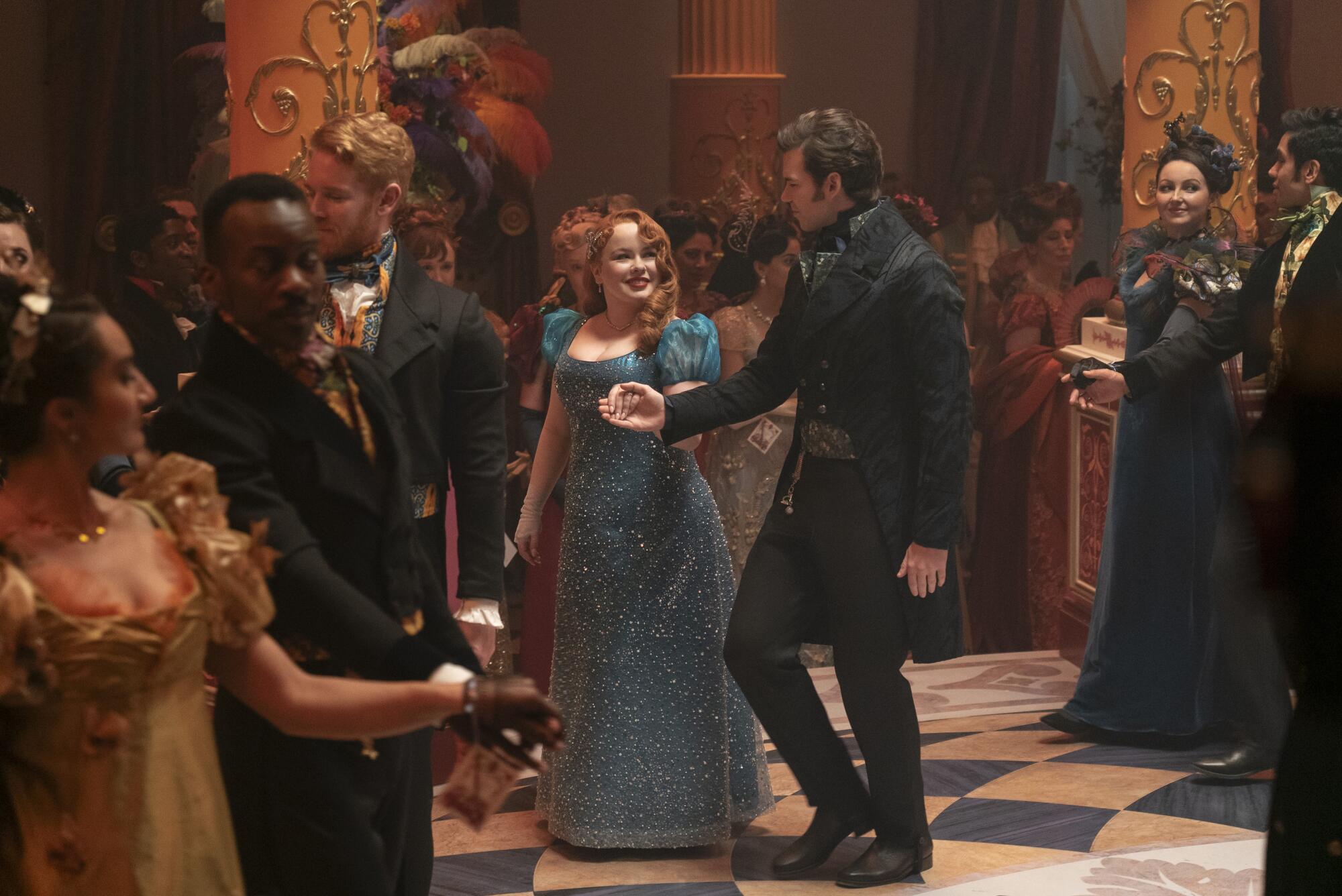
“On average, they get three one-hour sessions,” Murphy says. “It’s a lot of pressure. Luke keeps it very quiet, but he’s had a lot of dance experience — he’s danced on the West End stage. And Nicola has done some Irish dancing. So they’re very good at solo dancing. But couple dancing is a very different skill altogether, and they hadn’t had a lot of experience with that.”
Throughout shooting, Coughlan and Newton took advantage of breaks to practice their moves. “It’s such a different skill to act in something like this while dancing,” Newton says. “Today, I was even thinking about it, like ‘Why is this so much harder?’ But it is.”
Romance, says the ‘Bridgerton’ actor, ‘can really tap into very human, very private and very high-stakes human experiences.’
“Jack has been a constant throughout the whole show,” Coughlan adds. “It’s so nice to get to this point, to being the main couple this year and get to do all the dances. I love it.”
Most of the music is not written into the scripts. Murphy often choreographs a dance to a song that doesn’t end up in the episode, although Brownell sometimes has an idea of what she wants in advance.
“Jack and I would always have a confab about what song we wanted to use to choreograph the dances and that was usually my first attempt at making a pitch for what music I wanted to be at that ball,” Brownell says. “Sometimes we would get to editing and we’d be going, ‘Oh, actually, that song doesn’t quite work.’ But we would try to sneak in some songs that we wanted to use and occasionally, they would make it all the way through.”
More to Read
The complete guide to home viewing
Get Screen Gab for everything about the TV shows and streaming movies everyone’s talking about.
You may occasionally receive promotional content from the Los Angeles Times.
